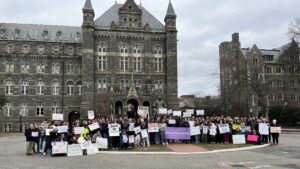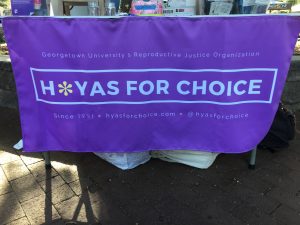Content warning: this article contains references to sexual assault.
Marlee Liss, award-winning speaker and author of Re-Humanize, held discussions with Georgetown students about alternative resolutions to sexual assault cases and heteronormativity in sexual education on April 12 and 13. The two events, titled “Restorative Justice for Sexual Harm: Why I Fought for a Circle, Not a Courtroom” and “The Sex Ed We Need: Consent, LGBTQ+ Inclusion & Pleasure,” were organized by Georgetown’s Sexual Assault Peer Educators (SAPE) for its Sexual Assault Awareness Month (SAAM) programming. Liss also spoke on the April 3 episode of the SAPE speaks podcast.
During the restorative justice event on April 12, Liss spoke about her experience being sexually assaulted as a college student. She first brought the case to court, but said that “the punitive process recreated a lot of the powerlessness experienced in trauma.”
“I remember being told like if I refuse to answer a question, or I don’t answer a question, I could be charged as noncooperative, and so it’s kind of this realization that in this fight for my right to consent and boundaries, I don’t have a right to consent and boundaries,” Liss added in an interview with the Voice after the event.
Liss explained that even if her assailant had been one of the very few that actually serve jail time— only 2.5 percent of accused rapists are incarcerated—she did not believe this approach would address the root of his behavior. 24 percent of sexual assaulters reoffend within 15 years, according to a study by the Office of Sex Offender Sentencing, Monitoring, Apprehending, Registering, and Tracking.
After three years of navigating a process that she found to be re-traumatizing, Liss considered dropping the charges entirely. She felt that she had no better options.
When one of her friends asked her to envision her ideal resolution, she realized that she wanted her attacker to recognize what he had done to her and apologize, something she did not anticipate seeing as a result of a criminal trial. After some research, she encountered the concept of restorative justice.
Restorative justice advances three core principles: encountering, repairing, and transforming harm. Liss successfully convinced the court to use a restorative justice approach, in which Liss’s attacker attended therapy to reach full accountability, according to Liss.
“He got into conversations around toxic masculinity, cultures of objectification, certain things in the media and social norms that justify degrading women and like, why was he able to justify those power dynamics?” Liss said.
After about seven months of therapy, Liss’ assailant and Liss met in what is known in restorative justice as “the circle.” Also in attendance were Liss’ mother and sister, as well as her lawyer and prosecutor—not in their official capacity, but as people who had been impacted by the event. One of the assailant’s close friends also participated, which Liss said “enhances his accountability.”
At the circle, Liss spoke for an hour about her struggle to process what had happened to her. She felt like she could finally abandon the struggle to seem like a credible victim, focusing instead on asking questions that she had held onto for the three years since the attack to better understand what had occurred.
“And that’s shown to be one of survivors’ most common needs is forming a coherent narrative,” Liss said. Her attacker explained how he had denied what he had done for a long time, and it was not until one of his friends came to him about being sexually assaulted and blaming herself that he first confronted his own role as a perpetrator of violence.
After sharing his process of realizing what he had done, he apologized to Liss. Her assailant recognized that nothing he said could reverse the assault, but that he hoped his presence at the circle would help heal some of that harm.
“I actually felt quite joyful, like deeply joyful, in terms of being really proud of myself, in terms of having transformed something so painful into healing,” Liss said. She believes that providing these alternative responses to sexual assault is key in order to best meet the needs of the survivor.
As advertised on its Instagram, SAPE’s SAAM programming this year focuses on “the intersection of sexual violence, gender identity, and sexual orientation.” Liss’ workshop on Thursday explored the ways in which traditional approaches to sexual education are heteronormative. The workshop explored ways that sexual education can be more inclusive of all sexual experiences.
Liss also discussed consent and communication both inside and outside of the bedroom. She led exercises to teach attendees how to recognize personal physical signs that they are uncomfortable with something, which often go unnoticed in the heat of the moment or out of the desire not to make the other person uncomfortable.
“Consent culture is the literal opposite to rape culture, right? So if we’re not teaching consent culture, we’re basically allowing rape culture to persist, or we’re actively reinforcing it,” Liss said.
H*yas for Choice holds a “So You Want to F*ck?” workshop every year as part of their work to destigmatize talking about sex at Georgetown. Incoming co-president Soraya Bata (SFS ’24) explained how this Q&A event works to destigmatize and facilitate sex-related conversations.
“There are a lot of people who have not been taught that silence is not the same as consent, for example. So I think that it’s really important to talk about it openly, so that everyone can learn exactly what consent means,” Bata said.
In discussing restorative justice and sexual education, Liss emphasized the importance of ongoing communication, rather than a one-size-fits-all narrative.
“There’s no one-size-fits-all when it comes to justice. There’s no one-size-fits-all when it comes to healing. No one-size-fits-all when it comes to sexuality,” Liss said.
–
Georgetown and D.C. Confidential Resources:
Health Education Services (HES): sarp@georgetown.edu
Counseling and Psychiatric Services (CAPS): (202) 687-6985; after hours, call (833) 960-3006 to reach Fonemed, a telehealth service; individuals may ask for the on-call CAPS clinician
Title IX Online Reporting Form: https://sexualassault.georgetown.edu/report/.
D.C. Rape Crisis Center: (202) 333-RAPE (24/7 Hotline)
Rape, Abuse, and Incest National Network (RAINN): 1-800-656-HOPE (24/7 hotline)




